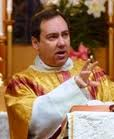 Fr. Z took time out from his Fourth of July holiday to grace his readers with the following top ten list of qualities of prospective priests today:
Fr. Z took time out from his Fourth of July holiday to grace his readers with the following top ten list of qualities of prospective priests today:
1. Prospective priests (Religious or Diocesan) are not looking primarily for community life, as we live it. They are looking for a Church-related mission that they believe in.
2. Prospective priests want to know what the Pope teaches, not what the U.N. teaches.
3. Prospective priests do not want to sit around with older “veterans” and listen to the latter whine about the Pope, Rome and the bishops.
4. Prospective priests are not in favor of women’s ordination. Period.
5. Prospective priests do not want to attend Masses that resemble hootenannies, Quaker meetings, or Presbyterian services.
6. Prospective priests are not ashamed of the Pro-life movement, they’re for it.
7. Prospective priests do not want to hear their brothers mock the Pope and gripe about liturgical norms.
8. Prospective priests do not want to study at theological unions/seminaries that are embarrassed by Catholic teaching.
9. Prospective priests know that Vatican II was not the only, or even the most important, Ecumenical Council.
10. Prospective priests are not embarrassed by Marian devotion, and are seen praying the Rosary.
I think this list is pretty accurate. I would say with respect to point one that prospective priests today tend to be inspired by the call for a “new evangelization.” Some feel a greater need for community life than others. Others who may not have thought much about it before seminary come to recognize the value of some form of community life, even as a diocesan priest.
What do you think of Fr. Z’s list?
Like this:
Like Loading...
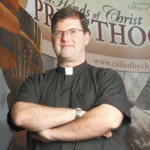 Check out this interview with Fr. Tim Hepburn, the vocations director for the Archdiocese of Atlanta, and former chaplain at Emory and Georgia Tech University. It’s good to hear his emphasis on evangelization and docility to the Holy Spirit. May the Lord bless his work!
Check out this interview with Fr. Tim Hepburn, the vocations director for the Archdiocese of Atlanta, and former chaplain at Emory and Georgia Tech University. It’s good to hear his emphasis on evangelization and docility to the Holy Spirit. May the Lord bless his work!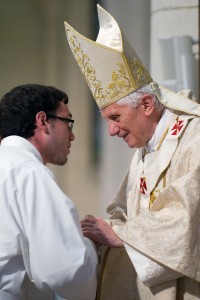
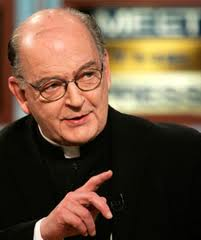
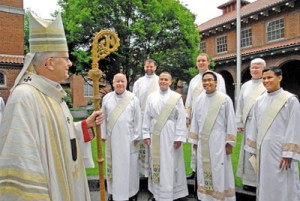 I thought I would end a busy week with
I thought I would end a busy week with  Fr. Z
Fr. Z The following
The following 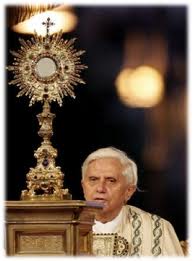 Sometimes it’s really difficult to decide upon just the right anniversary gift. However, I think our readers will agree that the following recommendation from the United States Conference of Catholic Bishops for the upcoming 60th anniversary of Pope Benedict’s priestly ordination–Eucharistic adoration for priestly vocations–is right on the money.
Sometimes it’s really difficult to decide upon just the right anniversary gift. However, I think our readers will agree that the following recommendation from the United States Conference of Catholic Bishops for the upcoming 60th anniversary of Pope Benedict’s priestly ordination–Eucharistic adoration for priestly vocations–is right on the money.  The
The 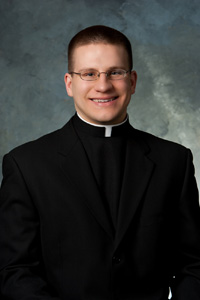 Phillip Owen, 26, says he has always felt the Blessed Mother watching over him. Born and raised in St. Luke Parish in River Forest, Owen is the eighth of 10 children in his family. The experience of growing up in a large family served him well, he said. “I learned at an early age what it meant to sacrifice, share with others, and be generous with my time,” he said. “My parents instilled in me the importance of sharing with others, being respectful of others, the importance of Sunday Mass, and the importance of daily prayer.”
Phillip Owen, 26, says he has always felt the Blessed Mother watching over him. Born and raised in St. Luke Parish in River Forest, Owen is the eighth of 10 children in his family. The experience of growing up in a large family served him well, he said. “I learned at an early age what it meant to sacrifice, share with others, and be generous with my time,” he said. “My parents instilled in me the importance of sharing with others, being respectful of others, the importance of Sunday Mass, and the importance of daily prayer.”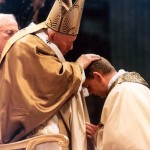 This week the United States Conference of Catholic Bishops made public its annual survey of newly ordained priests, conducted by the Center for Applied Research in the Apostolate (CARA), a Georgetown University-based research center. The Class of 2011: Survey of Ordinands to the Priesthood surveys the men being ordained priests for U.S. dioceses and religious communities this year.
This week the United States Conference of Catholic Bishops made public its annual survey of newly ordained priests, conducted by the Center for Applied Research in the Apostolate (CARA), a Georgetown University-based research center. The Class of 2011: Survey of Ordinands to the Priesthood surveys the men being ordained priests for U.S. dioceses and religious communities this year.